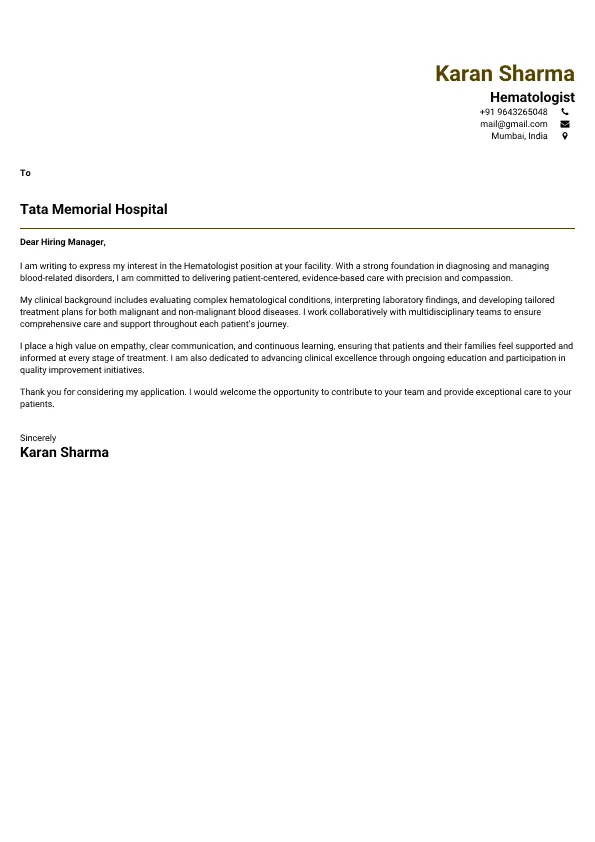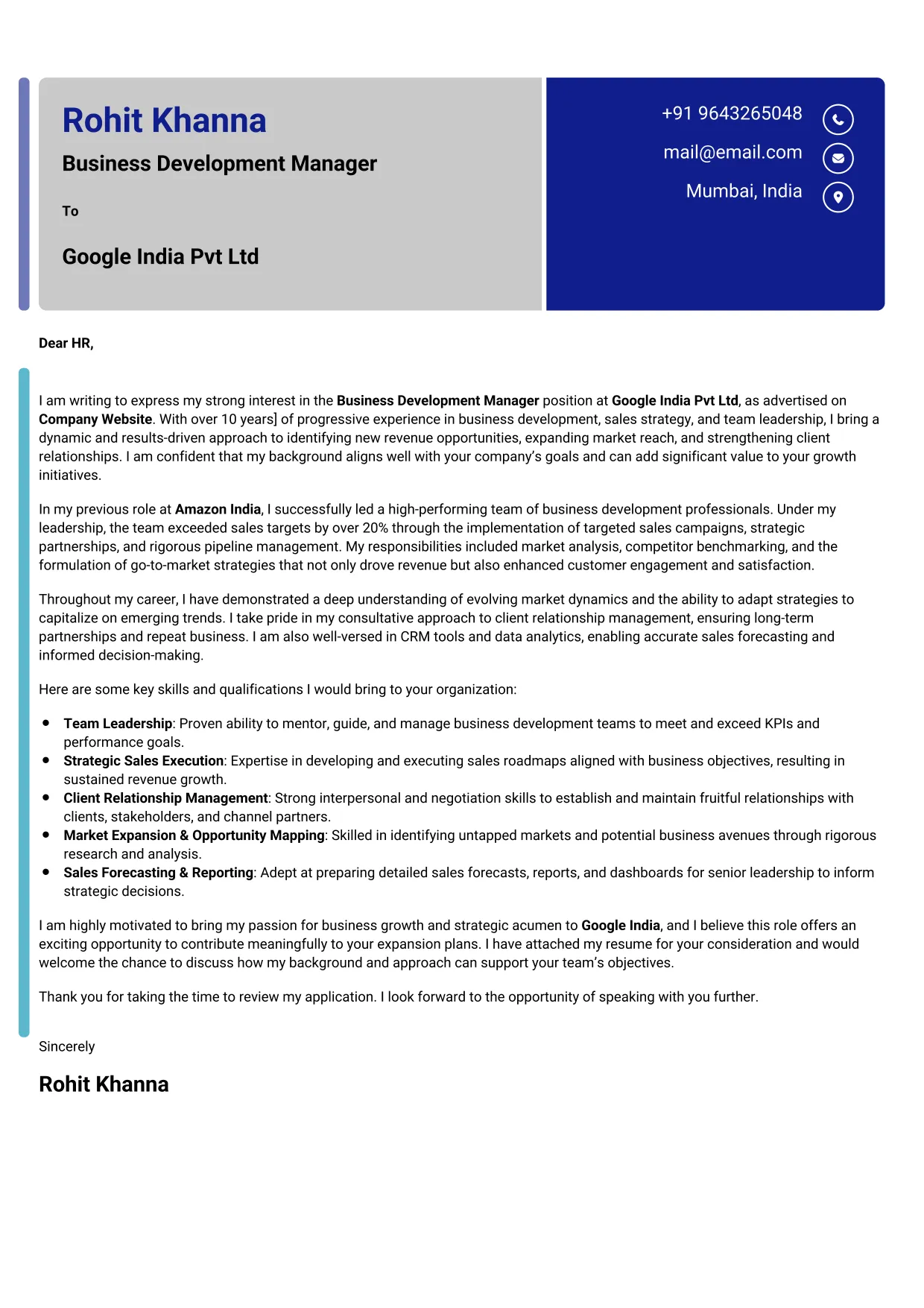Hematologist
Welcome to our Hematologist cover letter sample page! This professionally designed template is crafted to highlight your advanced medical expertise in blood disorders, clinical proficiency in diagnosis and treatment, and unwavering commitment to patient care. Whether you’re specializing in malignant or non-malignant hematology, coagulation, or transfusion medicine, this sample emphasizes key skills like diagnostic interpretation (blood smears, bone marrow biopsies), chemotherapy administration, complex case management, EMR proficiency, research contributions, and multidisciplinary team collaboration. Tailored to meet 2025 healthcare employer expectations, this guide will help you create a compelling cover letter that stands out in the competitive medical specialty and secures your next vital role.

Superbresume.com empowers Hematologists to craft cover letters that showcase their specialized clinical skills and patient focus. Our platform provides customizable templates tailored for demanding medical roles, emphasizing expertise in blood disorder diagnosis, treatment protocols, and compassionate care. With ATS-optimized formats, expert-written content suggestions, and real-time feedback, we ensure your cover letter aligns with clinical needs. Highlight achievements like improving patient outcomes for complex hematologic malignancies, leading successful clinical trials, contributing to medical education, or performing high volumes of specialized procedures with confidence. Superbresume.com helps you create a polished, results-driven cover letter that grabs hiring managers’ attention and lands interviews at respected healthcare organizations.
How to Write a Cover Letter for a Hematologist
Address the Hiring Manager: Use the hiring manager’s name (e.g., “Dear Dr. Gupta” or “Dear Chief of Hematology”) to personalize the letter and show attention to detail.
Highlight Relevant Experience: Focus on your clinical experience with various hematologic conditions (e.g., leukemia, lymphoma, anemia, clotting disorders), your proficiency in procedures (e.g., bone marrow biopsy, lumbar puncture), managing chemotherapy, and participation in multidisciplinary tumor boards.
Quantify Achievements: Use metrics (where appropriate and ethical), e.g., “Managed a caseload of 100+ patients with complex hematologic malignancies, improving remission rates by 10%,” or “Contributed to a clinical trial that led to a new therapeutic protocol for [specific condition].”
Incorporate Keywords: Include terms like “malignant hematology,” “non-malignant hematology,” “coagulation disorders,” “bone marrow biopsy,” “chemotherapy administration,” “EMR proficiency (Epic/Cerner),” “diagnostic interpretation,” “transfusion medicine,” “oncology,” or “clinical trials” from the job description to pass ATS filters.
Showcase Clinical Competencies: Mention specific advanced skills or subspecialties (e.g., stem cell transplantation, precision medicine in hematology, benign hematology) if relevant to the position.
Emphasize Patient Communication & Empathy: Highlight your ability to explain complex diagnoses and treatment plans clearly, manage sensitive conversations, and provide compassionate care to patients and families.
Demonstrate Research & Academic Contributions: Include any involvement in clinical research, publications, presentations, or medical education relevant to hematology.
Keep It Concise: Limit the cover letter to one page, focusing on your most impactful clinical contributions and patient care philosophy.
Close with Enthusiasm: End with a strong call to action, e.g., “I am eager to contribute my specialized expertise in hematology to [Hospital/Clinic Name]'s commitment to advancing patient outcomes in blood disorders.”
Cellular & Gene Therapies: Showcase expertise in advanced treatments like CAR T-cell therapy, stem cell transplantation, and emerging gene therapies for blood disorders.
Telemedicine for Follow-up Care: Highlight experience providing remote consultations for stable hematology patients, managing treatment side effects, or reviewing lab results.
Data Analytics for Outcomes Research: Demonstrate ability to use large patient datasets (e.g., EMR, cancer registries) for outcomes research, quality improvement, and identifying treatment patterns.
Integrated Cancer Care Models: Emphasize collaboration within multidisciplinary tumor boards, coordinating care with oncologists, radiation oncologists, pathologists, and palliative care specialists.
AI in Diagnostics (Awareness): Mention familiarity with or interest in how AI is assisting in analyzing blood smears, bone marrow biopsies, or predicting treatment responses.
Patient Education & Shared Decision-Making: Focus on empowering patients through comprehensive education about their complex conditions and involving them in treatment choices.
Burnout Prevention & Physician Well-being: While subtle, showing awareness of well-being strategies can be positive, especially in demanding specialties.
20 Key Skills for a Hematologist Cover Letter
| Malignant Hematology | Non-Malignant Hematology |
| Bone Marrow Biopsy & Aspiration | Chemotherapy Administration |
| Coagulation Disorders Management | Transfusion Medicine |
| Diagnostic Interpretation (Blood/Marrow) | EMR Proficiency (Epic, Cerner) |
| Complex Case Management | Clinical Trials & Research |
| Patient Education & Counseling | Multidisciplinary Tumor Board Participation |
| Communication (Sensitive & Empathetic) | Clinical Decision-Making |
| Problem-Solving (Differential Diagnosis) | Medical Charting |
| Compassion & Empathy | Time Management (Caseload) |
| Patient Safety Protocols | Ethical Practice |
10 Do’s for a Hematologist Cover Letter
Lead with Specialty & Patient Impact
Highlight Procedural Proficiency
Quantify Achievements
Showcase Collaboration
Include EMR Proficiency
Optimize for ATS
Keep It Professional & Compassionate
Mention Board Certification/Licensure
Proofread Meticulously
10 Don’ts for a Hematologist Cover Letter
Don’t Be Vague About Clinical Experience
Don’t Exceed One Page
Don’t Skip Technical Expertise
Don’t Use Complex Formats
Don’t Omit Patient Communication
Don’t Focus Only on Malignant Cases
Don’t Ignore Research/Academic Involvement
Don’t Include Irrelevant Experience
Don’t Forget to Update
5 FAQs for a Hematologist Cover Letter
Prioritize diagnosis/treatment of blood disorders (malignant/non-malignant), procedural skills (bone marrow biopsy), chemotherapy administration, EMR proficiency, and multidisciplinary collaboration.
Use standard formatting, avoid graphics, and include keywords like “hematologic malignancies,” “coagulation disorders,” “transfusion medicine,” and specific EMR systems from the job description.
Yes, if relevant to the role's focus (e.g., academic or research-heavy). Briefly mention the topic and its impact.
Describe a challenging patient case involving a rare or complex blood disorder, detailing your diagnostic approach, treatment plan, and coordination with other specialists to achieve a positive outcome.
Use a professional, knowledgeable, compassionate, and precise tone, conveying your clinical expertise and dedication to improving the lives of patients with blood disorders.
Get 5x more interviews with our crafted Resumes. We make Cover Letter that land jobs.

Free Customized Cover Letter + Expert Resume Advice
Receive a professionally tailored cover letter absolutely free with every resume order—plus expert guidance to make your resume stand out.
